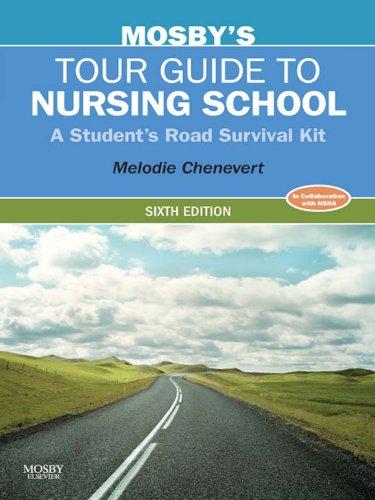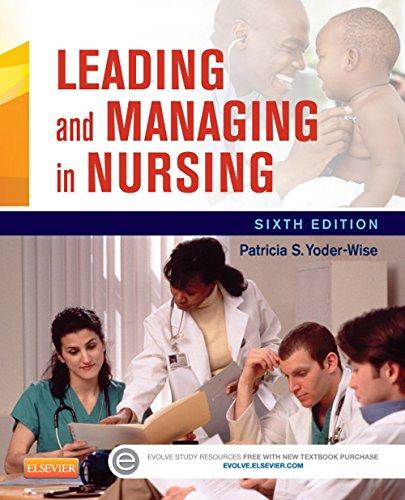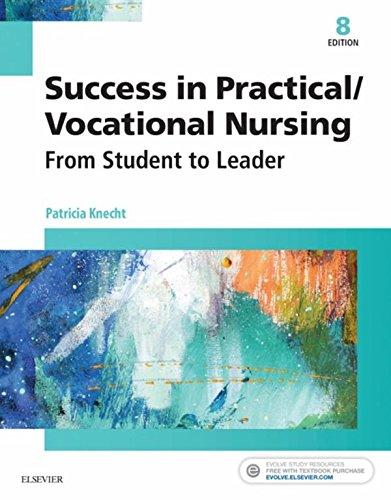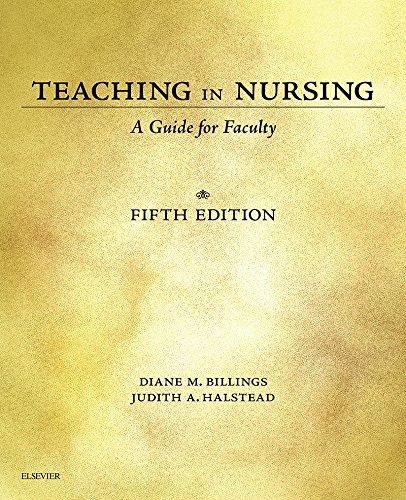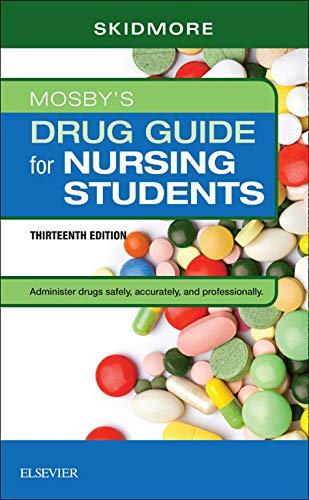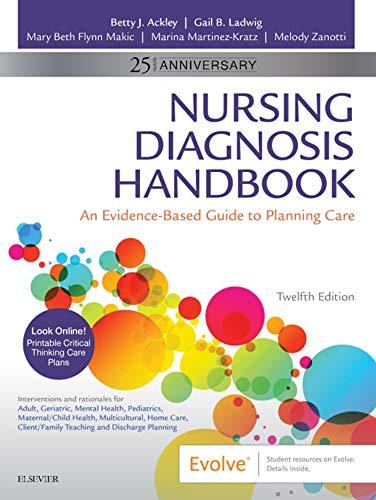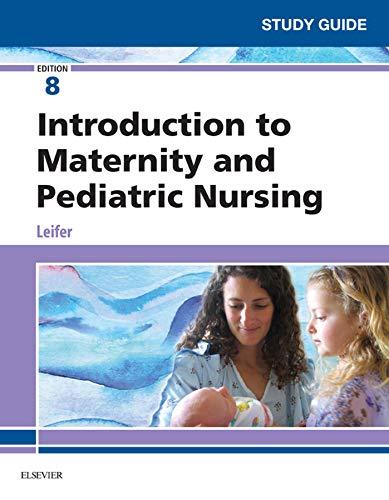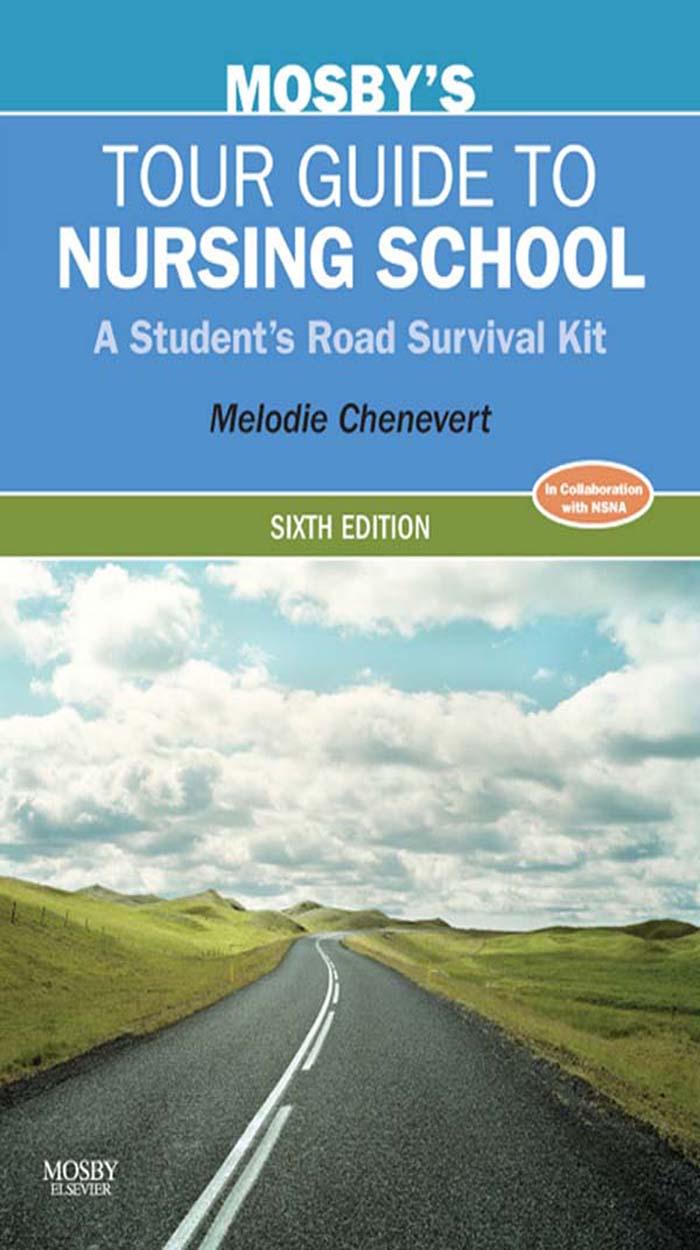Contents
1 Ticket to Ride, 2
Nursing is more than a great living. It’s a great life. Career options to last a lifetime.
2 The Starting Lineup, 8
If you’ve been admitted to a school of nursing, you can do anything! Cooperation, not competition, will bring success.
3 Is This Trip Really Necessary? 10
Determining whether you have what it takes to be a nurse. Diverse demands on a working nurse.
4 Destination: Registered Nurse, 16
Tangible and intangible rewards of nursing.
5 How Long Will This Trip Take? 22
Three preparatory paths to nursing. Career aspirations and financial and time considerations determine the length of education.
6 How Much Will This Trip Cost? 28
Calculating and defraying expenses. Being a smart consumer and getting your money’s worth.
7 Rules of the Road, 34
Don’t fight the system—work with it. Know your school’s rules and follow them to the letter. Collisions between personal freedoms and professional responsibilities.
8 Slower Traffic Keep Right, 38
Survival tips from students to students.
9 Driving Instructors, 44
The importance of knowing faculty members thoroughly and understanding the many roles they play.
10 More Miles Per Gallon, 50
Time management from A to Z.
11 Detours, 58
Turning wishes into goals and goals into accomplishments. Issues for the student who must work while going to school.
12 You Can’t Get There from Here, 64 Problem-solving and assertiveness skills.
13 Drive-Up Teller, 70
Making the best use of your memory bank: listening and learning, reading and remembering.
14 Tollbooth, 78
Test-taking skills designed to boost your grades.
15 Totaled, 86
Dealing with failure: major and minor.
16 How to Jump-Start Your Battery, 92 Procrastination and motivation.
17 10-4, Good Buddy, 98
How to form and conduct study groups. Supporting each other.
18 Preventive Maintenance, 106
The importance of taking care of yourself.
19 Scenic Routes, 110 Choosing electives.
20 Bridges, 114 Diversity within the nursing profession.
21 Business Routes, 120
Improving oral and written reports.
22 Hot-Wired, 128 Internet for nurses.
23 In the Driver’s Seat, 134
Taking full responsibility for your actions.
Another random document with no related content on Scribd:
insolence and pleasure. All they wanted now was what she herself wanted only a few short hours ago: to be bowed to when they caught certain people’s eyes; to be invited to one more dull house; to be put on the Rector’s Executive Committees, and pour tea at the Consuless’s “afternoons”.
“May I?” a man’s voice fluted; and a noble silver-thatched head with a beak-like nose and soft double chin was thrust into the doorway.
“Oh, Mr. Paly!” cried Mrs. Merriman; and murmured to the nearest ladies: “For the music— I thought he’d better come today.”
Every one greeted Mr. Paly with enthusiasm. It was poky, being only women and the Rector. And Mr. Paly had the dearest little flat in one of the old houses of the “Vieux Port”, such a tiny flat that one wondered how any one so large, manly and yet full of quick womanish movements, managed to fit in between the bric-a-brac. Mr. Paly clasped his hostess’s hand in a soft palm. “I’ve brought my young friend Lion Carstairs; you won’t mind? He’s going to help me with the programme.”
But one glance at Mr. Carstairs made it clear that he did not mean to help any one with anything. He held out two lax fingers to Mrs. Merriman, sank into an armchair, and let his Antinous-lids droop over his sullen deep gray eyes. “He’s awfully good on Sicilian music ... noted down folk-songs at Taormina....” Mr. Paly whispered, his leonine head with its bushy eye-brows and silver crown bending confidentially to his neighbour.
“Order!” rapped the Rector; and the meeting began.
At the Casino that night Kate Clephane, on the whole, was more bored than at the Rectory. After all, at the Merrimans’ there was a rather anxious atmosphere of kindliness, of a desire to help, and a retrospective piety about the war which had served them such a
good turn, and of which they were still trying, in their tiny measure, to alleviate the ravages.
Whereas the Betterlys—
“What? Another begging-list? No, my dear Kate; you don’t! Stonybroke; that’s what I am, and so’s Harry—ain’t you, Harry?” Marcia Betterly would scream, clanking her jewelled bangles, twisting one heavy hand through her pearls, and clutching with the other the platinum-and-diamond wrist-bag on which she always jokingly pretended that Kate Clephane had her eye. “Look out, Sid, she’s a regular train-robber; hold you up at your own door. I believe she’s squared the police: if she hadn’t she’d ’a been run in long ago.... Oh, the war? What war? Is there another war on? What, that old one? Why, I thought thatone was over long ago.... You can’t get anybody Iknow to talk about it even!”
“Guess we’ve got our work cut out paying for it,” added Horace Betterly, stretching a begemmed and bloated hand toward the winelist.
“Well, I should say!” his wife agreed with him.
“Sid, what form of liquid refreshment?” And “Sid”, a puffy Chicago business man, grew pink in his effort to look knowing and not name the wrong champagne....
It was odd: during her drive with Mrs. Minity, at Madame Lanska’s, and again at the Rectory, Kate Clephane had meant to proclaim her great news—and she had not yet breathed a word of it. The fact was, it was too great; too precious to waste on Mrs. Minity’s inattention, too sacred to reveal to Madame Lanska’s bridge-players, and too glorious to overwhelm those poor women at the Rectory with. And now, in the glare and clatter of the Casino, with the Sids and Harrys exchanging winks, and the Mrs. Sids and Harrys craning fat necks to see the last new cocotte, or the young Prince about whom there were such awful stories—here, of all places, to unbare her secret, name her daughter: how could she ever have thought it possible?
Only toward the end of the long deafening dinner, when Marcia and Mrs. Sid began to make plans for a week at Monte Carlo, and she found herself being impressed into the party (as she had, so often and so willingly, before) did Mrs. Clephane suddenly find herself assuming the defensive.
“You can’t? Or you won’t? Now, you Kate-cat you,” Marcia threatened her with a scented cigarette, “own up now—what’s doing? What you onto this time? Ain’t she naughty? We ain’t grand enough for her, girls!” And then, suddenly, at a sign from Horace, and lowering her voice, but not quite enough to make the communication private: “See here, Kate darling—of course, you know, as our guest: why, of course, naturally.” While, on the other side, Mrs. Sid drawled: “What I want to know is: where else can anybody go at this season?”
Mrs. Clephane surveyed her calmly. “To New York at least I can.”
They all screamed it at her at once: “N’York?” and again she dropped the two syllables slowly from disdainful lips.
“Well, I never! Whaffor, though?” questioned Horace from the depths of a fresh bumper.
Mrs. Clephane swept the table with a cool eye. “Business—family business,” she said.
“Criky!” burst from Horace. And: “Say, Sid, a drop of fine, just to help us over the shock? Well, here’s to the success of the lady’s Family Business!” he concluded with a just-perceptible wink, emptying his champagne goblet and replacing it by the big bubbleshaped liqueur glass into which a thoughtful waiter had already measured out the proper quantity of the most expensive fine.
III.
AS Kate Clephane stood on deck, straining her eyes at the Babylonian New York which seemed to sway and totter toward her menacingly, she felt a light hand on her arm.
“Anne!”
She barely suppressed the questioning lift of her voice; for the length of a heart-beat she had not been absolutely certain. Then ... yes, there was her whole youth, her whole married past, in that small pale oval—her own hair, but duskier, stronger; something of her smile too, she fancied; and John Clephane’s straight rather heavy nose, beneath old Mrs. Clephane’s awful brows.
“But the eyes—you chose your own eyes, my darling!” She had the girl at arms’-length, her own head thrown back a little: Anne was slightly the taller, and her pale face hung over her mother’s like a young moon seen through mist.
“So wise of you! Such an improvement on anything we had in stock....” How absurd! When she thought of the things she had meant to say! What would her child think her? Incurably frivolous, of course. Well, if she stopped to consider that she was lost.... She flung both arms about Anne and laid a long kiss on her fresh cheek.
“My Anne ... little Anne....”
She thirsted to have the girl to herself, where she could touch her hair, stroke her face, draw the gloves from her hands, kiss her over and over again, and little by little, from that tall black-swathed figure, disengage the round child’s body she had so long continued to feel against her own, like a warmth and an ache, as the amputated feel the life in a lost limb.
“Come, mother: this way. And here’s Mr. Landers,” the girl said. Her voice was not unkind; it was not cold; it was only muffled in fold on fold of shyness, embarrassment and constraint. After all, Kate
thought, it was just as well that the crowd, the confusion and Fred Landers were there to help them over those first moments.
“Fred Landers! Dear old Fred! Is it you, really? Known me anywhere? Oh, nonsense! Look at my gray hair. But you—” She had said the words over so often in enacting this imagined scene that they were on her lips in a rush; but some contradictory impulse checked them there, and let her just murmur “Fred” as her hand dropped into that of the heavy grizzled man with a red-and-yellow complexion and screwed-up blue eyes whom Time had substituted for the thin loosejointed friend of her youth.
Landers beamed on her, silent also; a common instinct seemed to have told all three that for the moment there was nothing to say— that they must just let propinquity do its mysterious work without trying to hasten the process.
In the motor Mrs. Clephane’s agony began. “What do they think of me?” she wondered. She felt so sure, so safe, so enfolded, with them; or she would have, if only she could have guessed what impression she was making. She put it in the plural, because, though at that moment all she cared for was what Anne thought, she had guessed instantly that, for a time at least, Anne’s view would be influenced by her guardian’s.
The very tone in which he had said, facing them from his seat between the piled-up bags: “You’ll find this young woman a handful —I’m not sorry to resign my trust—” showed the terms the two were on. And so did Anne’s rejoinder: “I’m not a handful now to any one but myself I’m in my own hands, Uncle Fred.”
He laughed, and the girl smiled. Kate wished her daughter and she had been facing each other, so that she could have seen the whole stretch of the smile, instead of only the tip dimpling away into a halfturned cheek. So much depended, for the mother, on that smile—on the smile, and the motion of those grave brows. The whole point was, how far did the one offset the other?
“Yes,” Mr. Landers assented, “you’re a free agent now—been one for just three weeks, haven’t you? So far you’ve made fairly good use of your liberty.”
Guardian and ward exchanged another smile, in which Kate felt herself generously included; then Landers’s eye turned to hers. “You’re not a bit changed, you know.”
“Oh, come! Nonsense.” Again she checked that silly “look at my gray hair.” “I hope one never is, to old friends—after the first shock, at any rate.”
“There wasn’t any first shock. I spotted you at once, from the pier.”
Anne intervened in her calm voice. “I recognized mother too—from such a funny old photograph, in a dress with puffed sleeves.”
Mrs. Clephane tried to smile. “I don’t know, darling, if I recognized you.... You were just there ... in me ... where you’ve always been....”
She felt her voice breaking, and was glad to have Mr. Landers burst in with: “And what do you say to our new Fifth Avenue?”
She stood surveying its upper reaches, that afternoon, from the window of the sitting-room Anne had assigned to her. Yes; Fred Landers was right, it was a new, an absolutely new, Fifth Avenue; but there was nothing new about Anne’s house. Incongruously enough—in that fluid city, where the stoutest buildings seemed like atoms forever shaken into new patterns by the rumble of Undergrounds and Elevateds—the house was the very one which had once been Kate’s, the home to which, four-and-twenty years earlier, she had been brought as a bride.
Her house, since she had been its mistress; but never hers in the sense of her having helped to make it. John Clephane lived by proverbs. One was that fools built houses for wise men to live in; so he had bought a fool’s house, furniture and all, and moved into it on
his marriage. But if it had been built by a fool, Kate sometimes used to wonder, how was it that her husband found it to be planned and furnished so exactly as he would have chosen? He never tired of boasting of the fact, seemingly unconscious of the unflattering inference to be drawn; perhaps, if pressed, he would have said there was no contradiction, since the house had cost the fool a great deal to build, and him, the wise man, very little to buy. It had been, he was never tired of repeating, a bargain, the biggest kind of a bargain; and that, somehow, seemed a reason (again Kate didn’t see why) for leaving everything in it unchanged, even to the heraldic stained glass on the stairs and the Jacobean mantel in a drawingroom that ran to Aubusson.... And here it all was again, untouched, unworn—the only difference being that she, Kate, was installed in the visitor’s suite on the third floor (swung up to it in a little jewelbox of a lift), instead of occupying the rooms below which had once been “Papa’s and Mamma’s”. The change struck her at once—and the fact that Anne, taking her up, had first pressed the wrong button, the one for the floor below, and then reddened in correcting her mistake. The girl evidently guessed that her mother would prefer not to go back to those other rooms; her having done so gave Kate a quick thrill.
“You don’t mind being so high up, mother?”
“I like it ever so much better, dear.”
“I’m so glad!” Anne was making an evident effort at expansiveness. “That’s jolly of you—like this we shall be on the same floor.”
“Ah, you’ve kept the rooms you had—?” Kate didn’t know how to put it.
“Yes: the old nursery. First it was turned into a schoolroom, then into my den. One gets attached to places. I never should have felt at home anywhere else. Come and see.”
Ah, here, at last, in the grim middle-aged house, were youth and renovation! The nursery, having changed its use, had perforce had to change its appearance. Japanese walls of reddish gold; a few
modern pictures; books; a budding wistaria in a vase of Corean pottery; big tables, capacious armchairs, an ungirlish absence of photographs and personal trifles. Not particularly original; but a sober handsome room, and comfortable, though so far from “cosy.”
Kate wondered: “Is it her own idea, or is this what the new girl likes?” She recalled the pink and white trifles congesting her maiden bower, and felt as if a rather serious-minded son were showing her his study. An Airedale terrier, stretched before the fire, reinforced the impression. She didn’t believe many of the new girls had rooms like this.
“It’s all your own idea, isn’t it?” she asked, almost shyly.
“I don’t know—yes. Uncle Fred helped me, of course. He knows a lot about Oriental pottery. I called him ‘Uncle’ after father died,” Anne explained, “because there’s nothing else to call a guardian, is there?”
On the wall Kate noticed a rough but vivid oil-sketch of a branch of magnolias. She went up to it, attracted by its purity of colour. “I like that,” she said.
Anne’s eyes deepened. “Do you? I did it.”
“You, dear? I didn’t know you painted.” Kate felt herself suddenly blushing; the abyss of all she didn’t know about her daughter had once more opened before her, and she just managed to murmur: “I mean, not like this. It’s very broad—very sure. You must have worked....”
The girl laughed, caught in the contagion of her mother’s embarrassment. “Yes, I’ve worked hard—I care for it a great deal.”
Kate sighed and turned from the picture. The few words they had exchanged—the technical phrases she had used—had called up a time when the vocabulary of the studio was forever in her ears, and she wanted, at that moment, to escape from it as quickly as she could.
Against the opposite wall was a deep sofa, books and a readinglamp beside it. Kate paused. “That’s just where your crib used to
stand!” She turned to the fireplace with an unsteady laugh. “I can see you by the hearth, in your little chair, with the fire shining through your bush of hair, and your toys on the shelf in front of you. You thought the sparks were red birds in a cage, and you used to try to coax them through the fender with bits of sugar.”
“Oh, did I? You darling, to remember!” The girl put an arm about Kate. It seemed to the mother, as the young warmth flowed through her, that everything else had vanished, and that together they were watching the little girl with the bush of hair coaxing the sparks through the fender.
Anne had left her, and Mrs. Clephane, alone in her window, looked down on the new Fifth Avenue. As it surged past, a huge lava-flow of interlaced traffic, her tired bewildered eyes seemed to see the buildings move with the vehicles, as a stationary train appears to move to travellers on another line. She fancied that presently even the little Washington Square Arch would trot by, heading the tide of sky-scrapers from the lower reaches of the city.... Oppressed and confused, she rejected the restless vision and called up in its place the old Fifth Avenue, the Fifth Avenue still intact at her marriage, a thoroughfare of monotonously ugly brown houses divided by a thin trickle of horse-drawn carriages; and she saw her mother-in-law, in just such a richly-curtained window, looking down, with dry mental comments, on old Mrs. Chivers’s C-spring barouche and Mrs. Beaufort’s new chestnut steppers, and knowing how long ago the barouche had been imported from Paris, and how much had been paid for the steppers—for Mrs. Clephane senior belonged to the generation which still surveyed its world from an upper window, like the Dutch ancestresses to whom the doings of the street were reported by a little mirror.
The contrast was too great; Kate Clephane felt herself too much a part of that earlier day. The overwhelming changes had all
happened, in a whirl, during the years of her absence; and meanwhile she had been living in quiet backwaters, or in the steady European capitals where renewals make so little mark on the unyielding surface of the past. She turned back into the room, seeking refuge in its familiar big-patterned chintz, the tufted lounge, the woolly architecture of the carpet. It was thoughtful of Anne to have left her.... They were both beginning to be oppressed again by a sense of obstruction: the packed memories of their so different pasts had jammed the passages between them. Anne had visibly felt that, and with a light kiss slipped out. “She’s perfect,” her mother thought, a little frightened....
She said to herself: “I’m dead tired—” put on a dressing-gown, dismissed the hovering Aline, and lay down by the fire. Then, in the silence, when the door had shut, she understood how excited she was, and how impossible it would be to rest.
Her eyes wandered about the unchanged scene, and into the equally familiar bedroom beyond—the “best spare-room” of old days. There hung the same red-eyed Beatrice Cenci above the double bed. John Clephane’s parents had travelled in the days when people still brought home copies of the Old Masters; and a mixture of thrift and filial piety had caused John Clephane to preserve their collection in the obscurer corners of his house. Kate smiled at the presiding genius selected to guard the slumbers of married visitors (as Ribera monks and Caravaggio gamblers darkened the digestive processes in the dining-room); she smiled, as she so often had—but now without bitterness—at the naïve incongruities of that innocent and inquisitorial past. Then her eye lit on the one novelty in the room: the telephone at her elbow. Oh, to talk to some one—to talk to Fred Landers, instantly! “There are too many things I don’t know ... I’m too utterly in the dark,” she murmured. She rushed through the directory, found his number, and assailed his parlour-maid with questions. But Mr. Landers was not at home; the parlour-maid’s inflexion signified: “At this hour?” and a glance at the clock showed Kate that the endless day had barely reached mid-afternoon. Of
course he would not be at home. But the parlour-maid added: “He’s always at his office till five.”
His office! Fred Landers had an office—had one still! Kate remembered that two-and-twenty years ago, after lunching with them, he used always to glance at his watch and say: “Time to get back to the office.” And he was well-off always had been. He needn’t—needn’t! What on earth did he do there, she wondered? What results, pecuniary or other, had he to show for his quartercentury of “regular hours”? She remembered that his profession had been legal—most of one’s men friends, in those remote days, were lawyers. But she didn’t fancy he had ever appeared in court; people consulted him about investments, he looked after estates. For the last years, very likely, his chief business had been to look after Anne’s; no doubt he was one of John Clephane’s executors, and also old Mrs. Clephane’s. One pictured him as deeply versed in willmaking and will-interpreting: he had always, in his dry mumbling way, rather enjoyed a quibble over words. Kate thought, by the way, that he mumbled less, spoke more “straight from the shoulder,” than he used to. Perhaps it was experience, authority, the fact of being consulted and looked up to, that had changed the gaunt shambling Fred Landers of old days into the four-square sort of man who had met her on the pier and disentangled her luggage with so little fuss. Oh, yes, she was sure the new Fred Landers could help her—advice was just what she wanted, and what, she suspected, he liked to give.
She called up his office, and in less than a minute there was his calm voice asking what he could do.
“Come at once—oh, Fred, you must!”
She heard: “Is there anything wrong?” and sent him a reassuring laugh.
“Nothing—except me. I don’t yet know how to fit in. There are so many things I ought to be told. Remember, I’m so unprepared—”
She fancied she felt a tremor of disapproval along the wire. Ought she not to have gone even as far as that on the telephone?
“Anne’s out,” she added hastily. “I was tired, and she told me to rest. But I can’t. How can I? Can’t you come?”
He returned, without the least acceleration of the syllables: “I never leave the office until—”
“Five. I know. But just today—”
There was a pause. “Yes; I’ll come, of course. But you know there’s nothing in the world to bother about,” he added patiently. (“He’s saying to himself,” she thought, “‘that’s the sort of fuss that used to drive poor Clephane out of his wits’.”)
But when he came he did not strike her as having probably said anything of the sort. There was no trace of “the office”, or of any other preoccupation, in the friendly voice in which he asked her if she wouldn’t please stay lying down, and let him do the talking.
“Yes, I want you to. I want you to tell me everything. And first of all —” She paused to gather up her courage. “What does Anne know?” she flung at him.
Her visitor had seated himself in the armchair facing her. The late afternoon light fell on his thick ruddy face, in which the small eyes, between white lids, looked startlingly blue. At her question the blood rose from his cheeks to his forehead, and invaded the thin pepperand-salt hair carefully brushed over his solidly moulded head.
“Don’t—don’t try to find out, I beg of you; I haven’t,” he stammered. She felt his blush reflected on her own pale cheek, and the tears rose to her eyes. How was he to help her if he took that tone? He did not give her time to answer, but went on, in a voice laboriously cheerful: “Look forward, not back: that’s the thing to do. Living with young people, isn’t it the natural attitude? And Anne is not the kind to dig and brood: thank goodness, she’s health itself, body and soul. She asks no questions; never has. Why should I have put it into her head that there were any to ask? Her grandmother didn’t. It was her
policy ... as it’s been mine. If we didn’t always agree, the old lady and I, we did on that.” He stood up and leaned against the mantel, his gaze embracing the pyramidal bronze clock on which a heavilydraped Muse with an Etruscan necklace rested her lyre. “Anne was simply given to understand that you and her father didn’t agree; that’s all. A girl,” he went on in an embarrassed tone, “can’t grow up nowadays without seeing a good many cases of the kind about her; Lord forgive me, they’re getting to be the rule rather than the exception. Lots of things that you, at her age, might have puzzled over and thought mysterious, she probably takes for granted. At any rate she behaves as if she did.
“Things didn’t always go smoothly between her and her grandmother. The child has talents, you know; developed ’em early. She paints cleverly, and the old lady had her taught; but when she wanted a studio of her own there was a row—I was sent for. Mrs. Clephane had never heard of anybody in the family having a studio; that settled it. Well, Anne’s going to have one now. And so it was with everything. In the end Anne invariably gets what she wants. She knew of course that you and her grandmother were not the best of friends—my idea is that she tried to see you not long after her father died, and was told by the old lady that she must wait till she was of age. They neither of them told me so—but, well, it was in the air. And Anne waited. But now she’s doubly free—and you see the first use she’s made of her freedom.” He had recovered his ease, and sat down again, his hands on his knees, his trouser-hem rather too high above wrinkled socks and solemn square-toed boots. “I may say,” he added smiling, “that she cabled to you without consulting me—without consulting anybody. I heard about it only when she showed me your answer. That ought to tell you,” he concluded gaily, “as much as anything can, about Anne. Only take her for granted, as she will you, and you’ve got your happiest days ahead of you—see if you haven’t.”
As he blinked at her with kindly brotherly eyes she saw in their ingenuous depths the terror of the man who has tried to buy off fate by one optimistic evasion after another, till it has become second
nature to hand out his watch and pocket-book whenever reality waylays him.
She exchanged one glance with that lurking fear; then she said: “Yes; you’re right, I suppose. But there’s not only Anne. What do other people know? I ought to be told.”
His face clouded again, though not with irritation. He seemed to understand that the appeal was reasonable, and to want to help her, yet to feel that with every word she was making it more difficult.
“What they know? Why ... why ... what they had to ... merely that....” (“What you yourself forced on them,” his tone seemed to imply.)
“That I went away....”
He nodded.
“With another man....”
Reluctantly he brought the words out after her: “With another man.”
“With Hylton Davies....”
“Hylton Davies....”
“And travelled with him—for nearly two years.”
He frowned, but immediately fetched a sigh of relief. “Oh, well— abroad. And he’s dead.” He glanced at her cautiously, and then added: “He’s not a man that many people remember.”
But she insisted: “After that....—”
Mr. Landers lifted his hand in a gesture of reassurance; the cloud was lifted from his brow. “After that, we all know what your life was. You’ll forgive my putting it bluntly: but your living in that quiet way— all these years—gradually produced a change of opinion ... told immensely in your favour. Even among the Clephane relations ... especially those who had glimpses of you abroad ... or heard of you when they were there. Some of the family distinctly disapproved of of John’s attitude; his persistent refusal ... yes, the Tresseltons even,
and the Drovers—I know they all did what they could—especially Enid Drover—”
Her blood rushed up and the pulses drummed in her temples. “If I cry,” she thought, “it will upset him—” but the tears rose in a warm gush about her heart.
“Enid Drover? I never knew—”
“Oh, yes; so that for a long time I hoped ... we all hoped....”
She began to tremble. Even her husband’s sister Enid Drover! She had remembered the Hendrik Drovers, both husband and wife, as among the narrowest, the most inexorable of the Clephane tribe. But then, it suddenly flashed across her, if it hadn’t been for the episode with Chris perhaps she might have come back years before. What mocking twists fate gave to one’s poor little life-pattern!
“Well—?” she questioned, breathless.
He met her gaze now without a shadow of constraint. “Oh, well, you know what John was—always the slave of anything he’d once said. Once he’d found a phrase for a thing, the phrase ruled him. He never could be got beyond that first vision of you ... you and Davies....”
“Never—?”
“No. All the years after made no difference to him. He wouldn’t listen. ‘Burnt child dreads the fire’ was all he would say. And after he died his mother kept it up. She seemed to regard it as a duty to his memory.... She might have had your life spread out before her eyes, day by day, hour by hour ... it wouldn’t have changed her.” He reddened again. “Some of your friends kept on trying ... but nothing made any difference.”
Kate Clephane lay silent, staring at the fire. Tentatively, fearfully, she was building up out of her visitor’s tones, his words, his reticences, the incredible fact that, for him and all her husband’s family—that huge imperious clan—her life, after she had left them, had been divided into two sharply differentiated parts: the brief lapse with
Hylton Davies, the long expiation alone. Of that third episode, which for her was the central fact of her experience, apparently not a hint had reached them. She was the woman who had once “stooped to folly”, and then, regaining her natural uprightness, had retained it inflexibly through all the succeeding years. As the truth penetrated her mind she was more frightened than relieved. Was she not returning on false pretences to these kindly forgiving relations? Was it not possible, indeed almost certain, that a man like Frederick Landers, had he known about Chris, would have used all his influence to dissuade Anne from sending for her, instead of exerting it in the opposite sense, as he avowedly had? And, that being so, was she not taking them all unawares, actually abusing their good faith, in passing herself off as the penitential figure whom the passage of blameless years had gradually changed from the offending into the offended? Yet was it, after all, possible that the affair with Chris, and the life she had led with him, could so completely have escaped their notice? Rumour has a million eyes, and though she had preserved appearances in certain, almost superstitious, ways, she had braved them recklessly in others, especially toward the end, when the fear of losing Chris had swept away all her precautions. Then suddenly the explanation dawned on her. She had met Chris for the first time less than a year before the outbreak of the war, and the last of their months together, the most reckless and fervid, had been overshadowed, blotted out of everybody’s sight, in that universal eclipse.
She had never before thought of it in that way: for her the war had begun only when Chris left her. During its first months she and he had been in Spain and Italy, shut off by the safe Alps or the neutral indifference; and the devouring need to keep Chris amused, and herself amusing, had made her fall into the easy life of the Italian watering-places, and the careless animation of Rome, without any real sense of being in an altered world. Around them they found only the like-minded; the cheerful, who refused to be “worried”, or the argumentative and paradoxical, like Chris himself, who thought it their duty as “artists” or “thinkers” to ignore the barbarian
commotion. It was only in 1915, when Chris’s own attitude was mysteriously altered, and she found him muttering that after all a fellow couldn’t stand aside when all his friends and the chaps of his own age were getting killed—only then did the artificial defences fall, and the reality stream in on her. Was his change of mind genuine? He often said that his opinions hadn’t altered, but that there were times when opinions didn’t count ... when a fellow just had to act. It was her own secret thought (had been, perhaps, for longer than she knew); but with Chris—could one ever tell? Whatever he was doing, he was sure, after a given time, to want to be doing something else, and to find plausible reasons for it: even the war might be serving merely as a pretext for his unrest. Unless ... unless he used it as an excuse for leaving her? Unless being with herwas what it offered an escape from? If only she could have judged him more clearly, known him better! But between herself and any clear understanding of him there had hung, from the first, the obscuring mist of her passion, muffling his face, touch, speech (so that now, at times, she could not even rebuild his features or recall his voice), obscuring every fold and cranny of his character, every trick of phrase, every doubling and dodging of his restless mind and capricious fancy. Sometimes, in looking back, she thought there was only one sign she had ever read clearly in him, and that was the first sign of his growing tired of her. Disguise that as she would, avert her eyes from it, argue it away, there the menace always was again, faint but persistent, like the tiny intermittent pang which first announces a mortal malady.
And of all this none of the people watching her from across the sea had had a suspicion. The war had swallowed her up, her and all her little concerns, as it had engulfed so many million others. It seemed written that, till the end, she should have to be thankful for the war.
Her eyes travelled back to Fred Landers, whose sturdy bulk, planted opposite her, seemed to have grown so far off and immaterial. Did he really guess nothing of that rainbow world she had sent her memory back to? And what would he think or say if she lifted the veil and let him into it?
“He’ll hate me for it—but I must,” she murmured. She raised herself on her elbow: “Fred—”
The door opened softly to admit Anne, with the Airedale at her heels. They brought in a glow of winter air and the strange cold perfume of the dusk.
“Uncle Fred? How jolly of you to have come! I was afraid I’d left mother alone too long,” the girl said, bending to her mother’s cheek. At the caress the blood flowed back into Kate’s heart. She looked up and her eyes drank in her daughter’s image.
Anne hung above her for a moment, tall, black-cloaked, remote in the faint light; then she dropped on her knees beside the couch.
“But you’re tired ... you’re utterly done up and worn out!” she exclaimed, slipping an arm protectingly behind her mother. There was a note of reproach and indignation in her voice. “You must never be tired or worried about things any more; I won’t have it; we won’t any of us have it. Remember, I’m here to look after you now— and so is Uncle Fred,” she added gaily.
“That’s what I tell her—nothing on earth to worry about now,” Mr. Landers corroborated, getting up from his chair and making for the door with muffled steps.
“Nothing, nothing—ever again! You’ll promise me that, mother, won’t you?”
Kate Clephane let her hand droop against the strong young shoulder. She felt herself sinking down into a very Bethesda-pool of forgetfulness and peace. From its depths she raised herself just far enough to say: “I promise.”
IV.
ANNE, withdrawing from her mother’s embrace, had decreed, in a decisive tone: “And now I’m going to ring for Aline to tuck you up in bed. And presently your dinner will be brought; consommé and chicken and champagne. Is that what you’ll like?”
“Exactly what I shall like. But why not share it with you downstairs?”
But the girl had been firm, in a sweet yet almost obstinate way. “No, dearest—you’re really tired out. You don’t know it yet; but you will presently. I want you just to lie here, and enjoy the fire and the paper; and go to sleep as soon as you can.”
Where did her fresh flexible voice get its note of finality? It was— yes, without doubt an echo of old Mrs. Clephane’s way of saying: “We’ll consider that settled, I think.”
Kate shivered a little; but it was only a passing chill. The use the girl made of her authority was so different—as if the old Mrs. Clephane in her spoke from a milder sphere—and it was so sweet to be compelled, to have things decided for one, to be told what one wanted and what was best for one. For years Kate Clephane had had to order herself about: to tell herself to rest and not to worry, to eat when she wasn’t hungry, to sleep when she felt staring wide-awake. She would have preferred, on the whole, that evening, to slip into a tea-gown and go down to a quiet dinner, alone with her daughter and perhaps Fred Landers; she shrank from the hurricane that would start up in her head as soon as she was alone; yet she liked better still to be “mothered” in that fond blundering way the young have of mothering their elders. And besides, Anne perhaps felt—not unwisely —that again, for the moment, she and her mother had nothing more to say to each other; that to close on that soft note was better, just then, than farther effort.
At any rate, Anne evidently did not expect to have her decision questioned. It was that hint of finality in her solicitude that made
Kate, as she sank into the lavender-scented pillows, feel—perhaps evoked by the familiar scent of cared-for linen—the closing-in on her of all the old bounds.
The next morning banished the sensation. She felt only, now, the novelty, the strangeness. Anne, entering in the wake of a perfect breakfast-tray, announced that Uncle Hendrik and Aunt Enid Drover were coming to dine, with their eldest son, Alan, with Lilla Gates (Lilla Gates, Kate recalled, was their married daughter) and Uncle Fred Landers. “No one else, dear, on account of this—” the girl touched her mourning dress—“but you’ll like to begin quietly, I know —after the fatigue of the crossing, I mean,” she added hastily, lest her words should seem to imply that her mother might have other reasons for shrinking from people. “No one else,” she continued, “but Joe and Nollie. Joe Tresselton, you know, married Nollie Shriner —yes, one of the Fourteenth Street Shriners, the one who was first married to Frank Haverford. She was divorced two years ago, and married Joe immediately afterward.” The words dropped from her as indifferently as if she had said: “She came out two years ago, and married Joe at the end of her first season.”
“Nollie Tresselton’s everything to me,” Anne began after a pause. “You’ll see—she’s transformed Joe. Everybody in the family adores her. She’s waked them all up. Even Aunt Enid, you know—. And when Lilla came to grief—”
“Lilla? Lilla Gates?”
“Yes. Didn’t you know? It was really dreadful for Aunt Enid— especially with her ideas. Lilla behaved really badly; even Nollie thinks she did. But Nollie arranged it as well as she could.... Oh, but I’m boring you with all this family gossip.” The girl paused, suddenly embarrassed; then, glancing out of the window: “It’s a lovely morning, and not too cold. What do you say to my running you up to Bronx Park and back before lunch, just to give you a glimpse of what Nollie calls our New York? Or would you rather take another day to rest?”
The rush through the vivid air; the spectacle of the new sumptuous city; of the long reaches above the Hudson with their showy architecture and towering “Institutions”; of the smooth Boulevards flowing out to cared-for prosperous suburbs; the vista of Fifth Avenue, as they returned, stretching southward, interminably, between monumental façades and resplendent shop-fronts—all this and the tone of Anne’s talk, her unconscious allusions, revelations of herself and her surroundings, acted like champagne on Kate Clephane’s brain, making the world reel about her in a headlong dance that challenged her to join it. The way they all took their mourning, for instance! She, Anne, being her grandmother’s heiress (she explained) would of course not wear colours till Easter, or go to the Opera (except to matinées) for at least another month. Didn’t her mother think she was right? “Nollie thinks it awfully archaic of me to mix up music and mourning; what have they got to do with each other, as she says? But I know Aunt Enid wouldn’t like it ... and she’s been so kind to me. Don’t you agree that I’d better not?”
“But of course,
dear; and I think
your aunt’s right.”
Inwardly, Kate was recalling the inexorable laws which had governed family affliction in the New York to which she had come as a bride: three crape-walled years for a parent, two for sister or brother, at least twelve solid months of black for grandparent or aunt, and half a year (to the full) for cousins, even if you counted them by dozens, as the Clephanes did. As for the weeds of widowhood, they were supposed to be measured only by the extent of the survivor’s affliction, and that was expected to last as long, and proclaim itself as unmistakably in crape and seclusion, as the most intolerant censor in the family decreed—unless you were prepared to flout the whole clan, and could bear to be severely reminded that your veil was a quarter of a yard shorter than cousin Julia’s, though her bereavement antedated yours by six months. Much as Kate Clephane had suffered under the old dispensation, she felt a slight recoil from the indifference that had succeeded it. She herself, just
before sailing, had replaced the coloured finery hastily bought on the Riviera by a few dresses of unnoticeable black, which, without suggesting the hypocrisy of her wearing mourning for old Mrs. Clephane, yet kept her appearance in harmony with her daughter’s; and Anne’s question made her glad that she had done so.
The new tolerance, she soon began to see, applied to everything; or, if it didn’t, she had not yet discovered the new prohibitions, and during all that first glittering day seemed to move through a millennium where the lamb of pleasure lay down with the lion of propriety.... After all, this New York into which she was being reinducted had never, in any of its stages, been hers; and the fact, which had facilitated her flight from it, leaving fewer broken ties and uprooted habits, would now, she saw, in an equal measure simplify her return. Her absence, during all those years, had counted, for the Clephanes, only in terms of her husband’s humiliation; there had been no family of her own to lament her fall, take up her defence, quarrel with the clan over the rights and wrongs of the case, force people to take sides, and leave a ramification of vague rancours to which her return would give new life. The old aunts and indifferent cousins at Meridia—her remote inland town—had bowed their heads before the scandal, thanking fortune that the people they visited would probably never hear of it. And now she came back free of everything and every one, and rather like a politician resuming office than a prodigal returning to his own.
The sense of it was so rejuvenating that she was almost sure she was looking her best (and with less help than usual from Aline) when she went down to dinner to meet the clan. Enid Drover’s appearance gave a momentary check to her illusion: Enid, after eighteen years, seemed alarmingly the same—pursed-up lips, pure vocabulary and all. She had even kept, to an astonishing degree, the physical air of her always middle-aged youth, the smooth complexion, symmetrically-waved hair and empty eyes that made her plump small-nosed face like a statue’s. Yet the mere fact of her daughter Lilla profoundly altered her—the fact that she could sit beaming maternally across the table at that impudent stripped
version of herself, with dyed hair, dyed lashes, drugged eyes and unintelligible dialect. And her husband, Hendrik Drover—the typical old New Yorker—that he too should accept this outlawed daughter, laugh at her slang, and greet her belated entrance with the remark: “Top-notch get-up tonight, Lil!”
“Oh, Lilla’s going on,” laughed Mrs. Joe Tresselton, slipping her thin brown arm through her cousin’s heavy white one.
Lilla laughed indolently. “Ain’t you?”
“No—I mean to stay and bore Aunt Kate till the small hours, if she’ll let me.”
AuntKate!How sweet it sounded, in that endearing young voice! No wonder Anne had spoken as she did of Nollie. Whatever Mrs. Joe Tresselton’s past had been, it had left on her no traces like those which had smirched and deadened Lilla. Kate smiled back at Nollie and loved her. She was prepared to love Joe Tresselton too, if only for having brought this live thing into the family. Personally, Joe didn’t at first offer many points of contact: he was so hopelessly like his cousin Alan Drover, and like all the young American officers Kate had seen on leave on the Riviera, and all the young men who showed off collars or fountain-pens or golf-clubs in the backs of American magazines. But then Kate had been away so long that, as yet, the few people she had seen were always on the point of being merged into a collective American Face. She wondered if Anne would marry an American Face, and hoped, before that, to learn to differentiate them; meanwhile, she would begin by practising on Joe, who, seating himself beside her with the collective smile, seemed about to remark: “See that Arrow?”
Instead he said: “Anne’s great, isn’t she, Aunt Kate?” and thereby acquired an immediate individuality for Anne’s mother. Dinner was announced, and at the dining-room door Kate wavered, startled by the discovery that it was still exactly the same room— black and gold, with imitation tapestries and a staring white bust niched in a red marble over-mantel—and feeling once more
uncertain as to what was expected of her. But already Anne was guiding her to her old seat at the head of the table, and waiting for her to assign their places to the others. The girl did it without a word; just a glance and the least touch. If this were indeed a mannerless age, how miraculously Anne’s manners had been preserved!
And now the dinner was progressing, John Clephane’s champagne bubbling in their glasses (it seemed oddest of all to be drinking her husband’s Veuve Clicquot), Lilla steadily smoking, both elbows on the table, and Nollie Tresselton leading an exchange of chaff between the younger cousins, with the object, as Kate Clephane guessed, of giving her, the newcomer, time to take breath and get her bearings. It was wonderful, sitting there, to recall the old “family dinners”, when Enid’s small censorious smile (Enid, then in her twenties!) seemed as inaccessible to pity as the forbidding line of old Mrs. Clephane’s lips; when even Joe Tresselton’s mother (that lazy fat Alethea Tresselton) had taken her cue from the others, and echoed their severities with a mouth made for kissing and forgiving; and John Clephane, at the foot of the table, proud of his house, proud of his wine, proud of his cook, still half-proud of his wife, was visibly saying to himself, as he looked about on his healthy handsome relatives: “After all, blood is thicker than water.”
The contrast was the more curious because nothing, after all, could really alter people like the Drovers. Enid was still gently censorious, though with her range of criticism so deflected by the huge exception to be made for her daughter that her fault-finding had an odd remoteness: and Hendrik Drover, Kate guessed, would be as easily shocked as of old by allusions to the “kind of thing they did in Europe”, though what they did at home was so vividly present to him in Lilla’s person, and in the fact of Joe Tresselton’s having married a Fourteenth Street Shriner, and a divorced one at that.
It was all too bewildering for a poor exile to come to terms with— Mrs. Clephane could only smile and listen, and be thankful that her
own case was so evidently included in the new range of their indulgence.
But the young people—what did they think? That would be the interesting thing to know. They had all, she gathered, far more interests and ideas than had scantily furnished her own youth, but all so broken up, scattered, and perpetually interrupted by the strenuous labour of their endless forms of sport, that they reminded her of a band of young entomologists, equipped with the newest thing in nets, but in far too great a hurry ever to catch anything. Yet perhaps it seemed so only to the slower motions of middle-age.
Kate’s glance wandered from Lilla Gates, the most obvious and least interesting of the group, to Nollie Shriner (one of the “awful” Fourteenth Street Shriners); Nollie Shriner first, then Nollie Haverford, wife of a strait-laced Albany Haverford, and now Nollie Tresselton, though she still looked, with her brown squirrel-face and slim little body, like a girl in the schoolroom. Yes, even Nollie seemed to be in a great hurry; one felt her perpetually ordering and sorting and marshalling things in her mind, and the fact, Kate presently perceived, now and then gave an odd worn look of fixity to her uncannily youthful face. Kate wondered when there was ever time to enjoy anything, with that perpetual alarm-clock in one’s breast. Her glance travelled on to her own daughter. Anne seemed eager too, but not at such a pace, or about such a multiplicity of unrelated things. Perhaps, though, it was only the fact of being taller, statelier —old-fashioned words still fitted Anne—which gave her that air of boyish aloofness. But no; it was the mystery of her eyes—those eyes which, as Kate had told her, she had chosen for herself from some forgotten ancestral treasury into which none of the others had dipped. Between olive and brown, but flecked with golden lights, a little too deep-set, the lower lid flowing up smooth and flat from the cheek, and the black lashes as evenly set as the microscopic plumes in a Peruvian feather-ornament; and above them, too prominent, even threatening, yet melting at times to curves of maiden wonder,
the obstinate brows of old Mrs. Clephane. What did those eyes portend?
Kate Clephane glanced away, frightened at the riddle, and absorbed herself in the preoccupying fact that the only way to tell the Drovers from the Tresseltons was to remember that the Drovers’ noses were even smaller than the Tresseltons’ (but would that help, if one met one of either tribe alone?). She was roused by hearing Enid Drover question plaintively, as the ladies regained the drawing-room: “But after all, why shouldn’tAnne go too?”
The women formed an interrogative group around Mrs. Clephane, who found herself suddenly being scrutinized as if for a verdict. She cast a puzzled glance at Anne, and her daughter slipped an arm through hers but addressed Mrs. Drover.
“Go to Madge Glenver’s cabaret-party with Lilla? But there’s no real reason at all why I shouldn’t—except that my preference, like Nollie’s, happens to be for staying at home this evening.”
Mrs. Drover heaved a faint sigh of relief, but her daughter, shrugging impatient shoulders out of her too-willing shoulder-straps, grumbled: “Then why doesn’t Aunt Kate come too? You’ll talk her to death if you all stay here all the evening.”
Nollie Tresselton smiled. “So much for what Lilla thinks of the charm of our conversation!”
Lilla shrugged again. “Not your conversation particularly. I hate talking. I only like noises that don’t mean anything.”
“Does that rule out talking—quite?”
“Well, I hate cleverness, then; you and Anne are always being clever. You’ll tire Aunt Kate a lot more than Madge’s party would.” She stood there, large and fair, the features of her small inexpressive face so like her mother’s, the lines of her relaxed inviting body so different from Mrs. Drover’s righteous curves. Her painted eyes rested curiously on Mrs. Clephane. “You don’t suppose she spent her time
in Europe sitting at home like this, do you?” she asked the company with simplicity.
There was a stricken pause. Kate filled it by saying with a laugh: “You’ll think I might as well have, when I tell you I’ve never in my life been to a cabaret-party.”
Lilla’s stare deepened; she seemed hardly able to take the statement in. “What did you do with your evenings, then?” she questioned, after an apparently hopeless search for alternatives.
Mrs. Drover had grown pink and pursed-up; even Nollie Tresselton’s quick smile seemed congealed. But Kate felt herself carrying it off on wings. “Very often I just sat at home alone, and thought of you all here, and of our first evening together—this very evening.”
She saw Anne colour a little, and felt the quick pressure of her arm. That they should have found each other again, she and Anne!
The butler threw open the drawing-room door with solemnity. “A gentleman has called in his motor for Mrs. Gates; he sends word that he’s in a hurry, madam, please.”
“Oh,” said Lilla, leaping upon her fan and vanity bag. She was out of the room before the butler had rounded off his sentence.
Mrs. Drover, her complacency restored, sank down on a plump Clephane sofa that corresponded in richness and ponderosity with her own person. “Lilla’s such a baby!” she sighed; then, with a freer breath, addressed herself to sympathetic enquiries as to Mrs. Clephane’s voyage. It was evident that, as far as the family were concerned, Anne’s mother had been born again, seven days earlier, on the gang-plank of the liner that had brought her home. On these terms they were all delighted to have her back; and Mrs. Drover declared herself particularly thankful that the voyage had been so smooth.
V.
SMOOTHNESS, Kate Clephane could see, was going to mark the first stage of her re-embarkation on the waters of life. The truth came to her, after that first evening, with the surprised discovery that the family had refrained from touching on her past not so much from prudery, or discretion even, as because such retrogressions were jolting uncomfortable affairs, and the line of least resistance flowed forward, not back. She had been right in guessing that her questions as to what people thought of her past were embarrassing to Landers, but wrong in the interpretation of his embarrassment. Like every one else about her, he was caught up in the irresistible flow of existence, which somehow reminded her less of a mighty river tending seaward than of a moving stairway revolving on itself. “Only they all think it’s a river....” she mused.
But such thoughts barely lit on her tired mind and were gone. In the first days, after she had grasped (without seeking its explanation) the fact that she need no longer be on her guard, that henceforth there would be nothing to conjure away, or explain, or disguise, her chief feeling was one of illimitable relief. The rapture with which she let herself sink into the sensation showed her for the first time how tired she was, and for how long she had been tired. It was almost as if this sense of relaxation were totally new to her, so far back did her memory have to travel to recover a time when she had not waked to apprehension, and fallen asleep rehearsing fresh precautions for the morrow. In the first years of her marriage there had been the continual vain effort to adapt herself to her husband’s point of view, to her mother-in-law’s standards, to all the unintelligible ritual with which they barricaded themselves against the alarming business of living. After that had come the bitterness of her first disenchantment, and the insatiable longing to be back on the nursery floor with Anne; then, through all the ensuing years, the many austere and lonely years, and the few consumed with her last passion, the ever-recurring need of one form of vigilance or another,
the effort to keep hold of something that might at any moment slip from her, whether it were her painfully-regained “respectability” or the lover for whom she had forgone it. Yes; as she looked back, she saw herself always with taut muscles and the grimace of ease; always pretending that she felt herself free, and secretly knowing that the prison of her marriage had been liberty compared with what she had exchanged it for.
That was as far as her thoughts travelled in the first days. She abandoned herself with the others to the flood of material ease, the torrent of facilities on which they were all embarked. She had been scornful of luxury when it had symbolized the lack of everything else; now that it was an adjunct of her recovered peace she began to enjoy it with the rest, and to feel that the daily perfection of her breakfast-tray, the punctual renewal of the flowers in her sittingroom, the inexhaustible hot water in her bath, the swift gliding of Anne’s motor, and the attentions of her household of servants, were essential elements of this new life.
At last she was at rest. Even the nature of her sleep was changed. Waking one morning—not with a jerk, but slowly, voluntarily, as it were—out of a soundless, dreamless night, a miraculous draught of sleep, she understood that for years even her rest had been unrestful. She recalled the uncertainty and apprehension always woven through her dreams, the sudden nocturnal wakings to a blinding, inextinguishable sense of her fate, her future, her past; and the shallow turbid half-consciousness of her morning sleep, which would leave her, when she finally woke from it, emptied of all power of action, all hope and joy. Then every sound that broke the nighthush had been irritating, had pierced her rest like an insect’s nagging hum; now the noises that accompanied her falling asleep and awakening seemed to issue harmoniously out of the silence, and the late and early roar of Fifth Avenue to rock her like the great reiterations of the sea.
“This is peace ... this mustbe peace,” she repeated to herself, like a botanist arrested by an unknown flower, and at once guessing it to
be the rare exquisite thing he has spent half his life in seeking.
Of course she would not have felt any of these things if Anne had not been the Anne she was. It was from Anne’s presence, her smile, her voice, the mystery of her eyes even, that the healing flowed. If Kate Clephane had an apprehension left, it was her awe—almost—of that completeness of Anne’s. Was it possible, humanly possible, that one could cast away one’s best treasure, and come back after nearly twenty years to find it there, not only as rare as one had remembered it, but ripened, enriched, as only beautiful things are enriched and ripened by time? It was as if one had set out some delicate plant under one’s window, so that it might be an object of constant vigilance, and then gone away, leaving it unwatched, unpruned, unwatered—how could one hope to find more than a dead stick in the dust when one returned? But Anne was real; she was not a mirage or a mockery; as the days passed, and her mother’s life and hers became adjusted to each other, Kate felt as if they were two parts of some delicate instrument which fitted together as perfectly as if they had never been disjoined—as if Anne were that other half of her life, the half she had dreamed of and never lived. To see Anne living it would be almost the same as if it were her own; would be better, almost; since she would be there, with her experience, and tenderness, to hold out a guiding hand, to help shape the perfection she had sought and missed.
These thoughts came back to her with particular force on the evening of Anne’s reappearance at the Opera. During the weeks since old Mrs. Clephane’s death the Clephane box had stood severely empty; even when the Opera House was hired for some charity entertainment, Anne sent a cheque but refused to give the box. It was awfully “archaic”, as Nollie Tresselton said; but somehow it suited Anne, was as much in her “style” as the close braids folded about her temples. “After all, it’s not so easy to be statuesque, and I like Anne’s memorial manner,” Nollie concluded.
Tonight the period of formal mourning for old Mrs. Clephane was over, and Anne was to go to the Opera with her mother. She had
